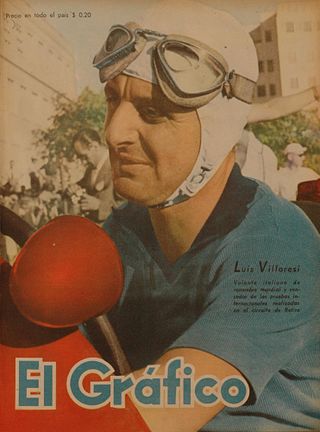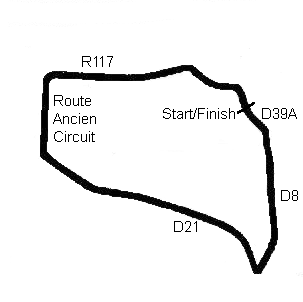
Alberto Ascari was an Italian racing driver and a two-time Formula One World Champion. Noted for careful precision and finely-judged accuracy, Ascari was a multitalented racer who competed in motorcycle racing before switching to cars. He won consecutive Formula One world titles in 1952 and 1953 for Scuderia Ferrari, being the team's first World Champion, and the last Italian to win the title as of 2024. This was sandwiched by an appearance in the 1952 Indianapolis 500, and winning the 1954 Mille Miglia.

La Baule-Escoublac, commonly referred to as La Baule, is a commune in the Loire-Atlantique department, Pays de la Loire, western France.

The Monza Circuit is a 5.793 km (3.600 mi) race track near the city of Monza, north of Milan, in Italy. Built in 1922, it was the world's third purpose-built motor racing circuit after Brooklands and Indianapolis and the oldest in mainland Europe. The circuit's biggest event is the Italian Grand Prix. With the exception of the 1980 running when the track was closed while undergoing refurbishment, the race has been hosted there since 1949.

The 1952 French Grand Prix was a Formula Two race held on 6 July 1952 at Rouen-Les-Essarts. It was race 4 of 8 in the 1952 World Championship of Drivers, in which each Grand Prix was run to Formula Two rules rather than the Formula One regulations normally used. Unusually this race was run over a duration of 3 hours, rather than a fixed distance.

The 1952 Dutch Grand Prix was a Formula Two race held on 17 August 1952 at the Circuit Zandvoort. It was race 7 of 8 in the 1952 World Championship of Drivers, in which each Grand Prix was run to Formula Two rules rather than the Formula One regulations normally used. The 90-lap race was won by Ferrari driver Alberto Ascari after he started from pole position. His teammates Giuseppe Farina and Luigi Villoresi finished in second and third places. Ascari overtook Fangio's record for the most race wins, scoring his seventh at this race.

The 1952 Italian Grand Prix was a Formula Two race held on 7 September 1952 at Monza. It was the eighth and final round of the 1952 World Championship of Drivers, in which each Grand Prix was run to Formula Two rules rather than the Formula One regulations normally used. The 80-lap race was won by Ferrari driver Alberto Ascari after he started from pole position. José Froilán González finished second for the Maserati team and Ascari's teammate Luigi Villoresi came in third.

The 1953 Dutch Grand Prix was a Formula Two race held on 7 June 1953 at the Circuit Zandvoort. It was race 3 of 9 in the 1953 World Championship of Drivers, which was run to Formula Two rules in 1952 and 1953, rather than the Formula One regulations normally used. The 90-lap race was won by Ferrari driver Alberto Ascari after he started from pole position. His teammate Nino Farina finished second and Maserati drivers José Froilán González and Felice Bonetto came in third

The 1953 French Grand Prix was a Formula Two race held on 5 July 1953 at Reims. It was race 5 of 9 in the 1953 World Championship of Drivers, which was run to Formula Two rules in 1952 and 1953, rather than the Formula One regulations normally used.

The 1955 Formula One season was the ninth season of FIA Formula One motor racing. It featured the sixth World Championship of Drivers, which was contested over seven races between 16 January and 11 September 1955. The season also included several non-championship races for Formula One cars.
The 1953 Formula One season was the seventh season of the FIA's Formula One racing. It consisted only of several non-championship motor races. As in 1952, all races counting towards the World Championship of Drivers, apart from the Indianapolis 500, were held for cars complying with Formula Two regulations rather than with Formula One, with the Indianapolis 500 held to AAA regulations.
The 1952 Formula One season was the sixth season of FIA Formula One motor racing. In comparison to previous seasons, the 1952 season consisted of a relatively small number of Formula One races, following the decision to run all the Grand Prix events counting towards the World Championship of Drivers to Formula Two regulations rather than Formula One. The Indianapolis 500, which also counted towards the World Championship, was still run to AAA regulations as in previous seasons. Since this season racing helmets were made mandatory in Formula One.
The 1951 Formula One season was the fifth season of FIA Formula One motor racing. It featured the 1951 World Championship of Drivers, which commenced on 27 May 1951 and ended on 28 October, after eight races. The season also included 14 races open to Formula One cars, but did not count towards the championship standings.
The 1950 Formula One season was the fourth season of the FIA's Formula One motor racing. It featured the inaugural FIA World Championship of Drivers, as well as several non-championship races. The championship, which commenced on 13 May and ended on 3 September, consisted of six Grand Prix races, each held in Europe and open to Formula One cars, plus the Indianapolis 500, which was run to AAA National Championship regulations. Giuseppe Farina won the championship from Juan Manuel Fangio and Luigi Fagioli.

Luigi Villoresi was an Italian racing driver. He competed in Formula One at the time of its inception.

Philippe Jean Armand Étancelin was a French racing driver, and a winner of the 1934 24 Hours of Le Mans. He competed primarily on the Grand Prix circuit, and was an early Formula One driver.

Louis Auguste Wagner was a French racing driver who won the American Grand Prize and the inaugural British Grand Prix. Wagner was also a pioneer aviator.

The 20th Grand Prix de la Marne was a non-championship Formula Two motor race held on 29 June 1952 at the Reims-Gueux circuit. It was the fourth round of the 1952 Les Grands Prix de France championship. Race distance was decided not by distance but by time, the duration being 3 hours. The race was won by Jean Behra driving a Gordini Type 16. Giuseppe Farina was second in a Ferrari 500, and his teammates Alberto Ascari and Luigi Villoresi shared third place, Villoresi's own car having suffered engine failure. Ascari set pole and fastest lap.

The XVI Grand Prix du Comminges was a Formula Two motor race held on 10 August 1952 in Saint-Gaudens, Haute-Garonne, France. It was round 7 of Les Grands Prix de France Championship. Race distance was determined by time rather than the number of laps, the result being declared after 3 hours. The win was shared by André Simon and Alberto Ascari in a Ferrari 500; Ascari taking over Simon's car after his own suffered mechanical failure. Ascari had started from pole, and also set fastest lap. Their teammate Giuseppe Farina finished second and Jean Behra in a Simca Gordini Type 15 was third.
The 2nd Grand Prix de Sables d'Olonne was a Formula Two motor race held on 13 July 1952 at Les Sables-d'Olonne, in Pays de la Loire, France. It was round 6 of Les Grands Prix de France Formula Two Championship. Race distance was decided not by distance but by time, the duration being 3 hours. The race was won by Luigi Villoresi in a Ferrari 500. Peter Collins was second in an HWM-Alta and Johnny Claes third in a Simca Gordini Type 15. Alberto Ascari started from pole in a Ferrari 500 and set fastest lap but crashed and retired.
The 2nd Bordeaux Grand Prix was a non-championship Formula Two motor race held on 3 May 1953 on a street circuit centred around the Place des Quinconces in Bordeaux, Gironde, France. The Grand Prix was won by Alberto Ascari in a Ferrari 500. Ascari's teammate Luigi Villoresi, starting from pole, was second. Juan Manuel Fangio, in a one-off drive in a Gordini Type 16 at the personal invitation of Amédée Gordini, was third. Giuseppe Farina set fastest lap in another Ferrari 500 but retired with gearbox problems.












